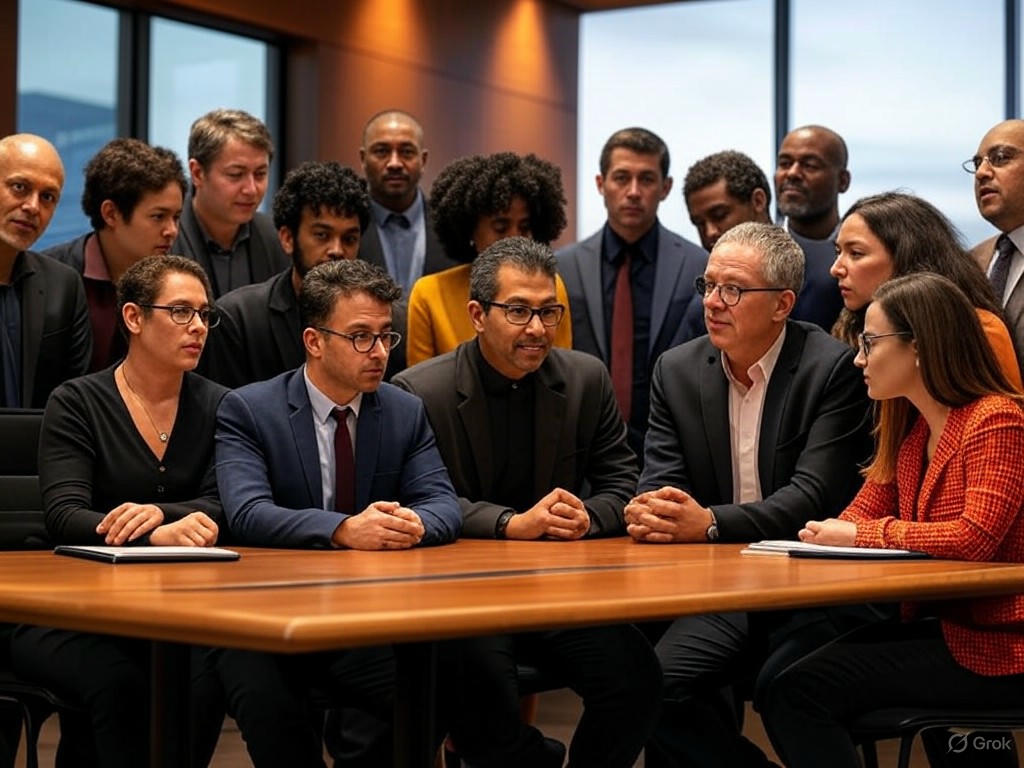
Due Process Confusion: Trump’s Uncertainty on US Rights Entitlements
Trump’s Constitutional Controversy: Questioning Due Process Protections
Have you ever wondered how a simple statement from a leader could shake the foundations of established rights? In a recent NBC’s “Meet the Press” interview, President Donald Trump stirred up debate by expressing uncertainty about his duty to uphold the Constitution amid his administration’s push for aggressive deportations. He responded to a direct question with, “I don’t know. I have to respond, again I have lawyers that [advise] me, they are [interpreting] obviously what the Supreme Court said.”
This moment highlights the growing confusion around due process rights, especially for non-citizens, and why it’s so crucial in our legal system. Just months after swearing to “preserve, protect and defend the Constitution,” this ambiguity has alarmed legal experts and advocates, who argue it could undermine long-standing protections. Imagine the ripple effects if core rights start to waver—it’s a scenario that affects everyone, from immigrants to everyday citizens.
Due Process Rights in Immigration Enforcement
At the core of this issue lies a fundamental question: Do non-citizens deserve due process rights under the US Constitution? The Supreme Court has long affirmed this in cases like Reno v. Flores, stating that the Fifth Amendment extends these protections to aliens in removal proceedings. Yet, Trump’s comments directly challenge this, as he remarked that providing trials for millions could overwhelm the system, including those accused of serious crimes.
This disagreement isn’t just theoretical; it’s reshaping how we view justice in America. For instance, what if your neighbor, who’s lived here for years, faced deportation without a fair hearing? Such policies force us to confront whether due process rights are truly for all or only a select few, and that’s a debate worth paying attention to.
Streamlining Deportations and Due Process Challenges
The Trump administration’s efforts to speed up deportations have intensified these concerns. Policies include allowing judges to dismiss asylum claims without full hearings, cutting funds for legal aid to unaccompanied minors, and broadening expedited removal processes. Critics argue these steps risk eroding due process rights for vulnerable groups like migrants and asylum seekers.
Think about a young family arriving at the border, hoping for safety—do they get a chance to tell their story? These changes could mean no, and that’s not just policy; it’s a human story with real stakes. As someone interested in justice, you might ask: How can we balance security with fairness?
The Debate Over the Alien Enemies Act and Due Process Safeguards
Fast-forward to March 2025, when the administration invoked a 1798 law to deport immigrants labeled as gang members, sending many to harsh facilities like El Salvador’s maximum-security prisons. One case that stands out is Kilmarre Abrego Garcia, deported despite a court order against it due to fears of persecution. The administration admitted the error but claimed limited power to fix it, given ties to El Salvador’s leadership.
This situation underscores how due process rights can be overlooked in the name of efficiency. It’s like a historical echo, where old laws meet modern challenges, potentially leaving people in peril. If we’re not careful, such actions could set precedents that weaken protections for anyone.
Supreme Court’s Role in Upholding Due Process Protections
The Supreme Court has stepped in, with Justice Sotomayor’s dissent highlighting moves that seemed to bypass due process rights. She pointed out how migrants were transferred without explanation, gearing up for deportations under the Alien Enemies Act. This “covert preparation” raises alarms about transparency and fairness in enforcement.
Picture families separated overnight—it’s a stark reminder of why due process rights matter. The court’s involvement shows there’s a system of checks, but ongoing debates keep us questioning: Will these safeguards hold strong?
Exploring the Essentials of Due Process Rights
What exactly are due process rights, and why do they extend beyond citizens? The Fifth Amendment clearly states that no person can lose life, liberty, or property without due process, using “person” to include non-citizens on US soil. This means basic entitlements like a hearing, the ability to present evidence, appeals, and access to legal help, though not always free.
In practice, this protects individuals from arbitrary actions, ensuring decisions are fair and evidence-based. For example, if you’re facing deportation, wouldn’t you want a chance to defend yourself? These rights aren’t just legal jargon; they’re the backbone of a just society, promoting trust and stability.
Navigating Journalism’s Role in Due Process Debates
In an era of digital information, how we define “journalism” and “news” plays a big part in covering stories like this. Different regions, like Commonwealth law or New South Wales, set their own standards for who counts as a journalist, affecting how constitutional issues get reported. This matters because accurate coverage keeps the public informed about due process rights and potential erosions.
With social media blurring lines, misinformation can spread quickly, making it harder to discern facts. As a reader, you might think: How can I stay informed without getting lost in the noise? Seeking reliable sources is a smart first step to understanding these complex topics.
Information Challenges Amid Due Process Discussions
The broader landscape of “information disorder” complicates conversations around due process rights, with misinformation, disinformation, and malinformation muddying the waters. For instance, false claims about immigrants can influence public opinion and policy, often without intent to harm in the case of misinformation. This environment makes it tougher to have balanced debates on constitutional matters.
Consider a hypothetical: What if a viral post twists facts about deportation cases? It could sway perceptions and erode support for due process rights. Staying vigilant and verifying sources is one way to combat this, helping us engage more meaningfully with issues that affect real lives.
Historical and Legal Backdrop of Due Process Rights
Looking back, the struggle over due process rights for non-citizens isn’t new; it’s woven into US history through landmark cases. Laws like the Alien Enemies Act from 1798 were born of wartime fears but now face scrutiny for their modern use. Courts have consistently ruled that constitutional protections apply widely, serving as a check on executive actions.
In ongoing lawsuits, groups challenge these applications, arguing they violate due process rights by skipping hearings. This judicial oversight reminds us that no one branch operates unchecked, fostering a system where fairness prevails. It’s a lesson from history that could guide future reforms.
Balancing Executive Power and Due Process Protections
The courts act as guardians, reviewing claims that deportations lack proper process. In one case, plaintiffs didn’t seek freedom but asked to halt actions under the Act, emphasizing the need for evidence and defense. This dynamic ensures that even in tough enforcement scenarios, due process rights remain intact.
It’s like a safety net for democracy—without it, policies could become overly aggressive. If you’re following this story, reflect on how these balances protect not just immigrants, but all of us from potential abuses.
Future Implications for Due Process Rights in Policy
Trump’s stance might signal bolder moves in immigration, potentially sidelining due process rights for quicker results. This could mean more expedited deportations, raising alarms for asylum seekers and beyond. The risk? Weakening these rights for one group might erode protections for everyone, creating a slippery slope.
For actionable advice, consider advocating for reforms or educating yourself on local policies—small steps can make a difference. What are your thoughts on how we can safeguard these essential rights moving forward?
Wrapping Up the Due Process Debate
In the end, President Trump’s comments on constitutional duties spotlight a critical juncture for due process rights in America. As policies evolve, the courts will likely define the limits of power and preserve these foundational protections. This conversation isn’t just about immigration; it’s about upholding the principles that make our system strong.
Whether you’re passionate about justice or just curious, I encourage you to share your views in the comments below, explore related topics on our site, or spread this article to spark more discussion. Let’s keep the dialogue going—what changes do you hope to see?
References
- Politico. (2025). “I Don’t Know”: Trump on Constitution. Retrieved from https://www.politico.com/news/2025/05/04/i-dont-know-trump-constitution-00326040
- Supreme Court. (2024). Opinion in relevant case. Retrieved from https://www.supremecourt.gov/opinions/24pdf/24a931_2c83.pdf
- PMC NCBI. (n.d.). Article on information disorder. Retrieved from https://pmc.ncbi.nlm.nih.gov/articles/PMC11142451/
- ACCC. (n.d.). Report on digital platforms and news. Retrieved from https://www.accc.gov.au/system/files/ACCC+commissioned+report+-+The+impact+of+digital+platforms+on+news+and+journalistic+content,+Centre+for+Media+Transition+(2).pdf
due process rights, Trump constitution, deportation policy, Fifth Amendment, immigration enforcement, constitutional protections, US rights entitlements, constitutional debate, alien enemies act, immigration policy







